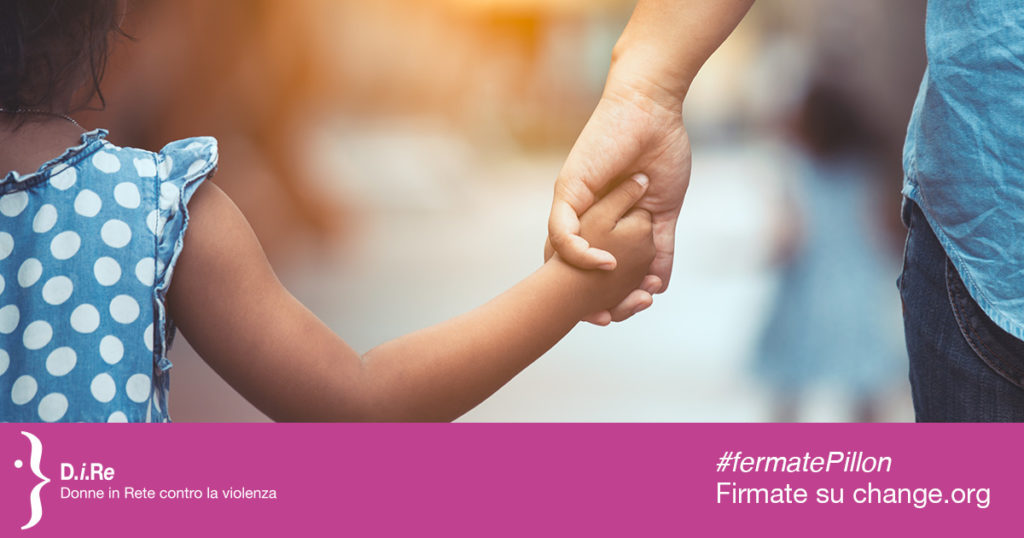The Pillon separation and custody bill is a dangerous device in which women who decide to end a relationship with an abusive partner and their sons and daughters risk being trapped.
The Bill poses serious risks to their safety, with no respect for the legitimate desire to leave behind the violence they have suffered or have witnessed.
For this D.i.Re, the national network that brings together 80 independent women's organizations that manage over a hundred anti-violence centers and shelters in 18 Italian regions, launches a great mobilization to counter this measure.
And it does so starting from the appeal that can be subscribed on Change.org.
Sign here and spread!

The text of the appeal
These days, while the media daily report stories of femicide, rape, violence, abuse in a chronicized sequence of horror, we not only continue to hear about the problem as a social emergency in spite of the evidence of the data that amply demonstrate how male violence against women is a structural and deeply rooted problem in our country, but we record the undisturbed progress of bills which, if approved, would inevitably favor the persistence of violence, especially intra-family violence.
We believe the DDL 735, presented by Senator Pillon and others, paradigmatically represents how substantially the systematization of a process of reappropriation of male power threatened by the new transnational norms and in particular by the Istanbul Convention.
The draft law "Rules on shared custody, direct maintenance and guarantee of two parents" intends to implement the provisions on the matter in the government contract by introducing regulatory changes regarding: - mandatory civil mediation in all separations in which minors are involved;
- the balance between both parental figures and equal times in care and education and therefore joint custody and double domicile for minors;
- the direct support of the children, without automatisms in the recognition of a check to be paid to the spouse, attributing to each specific items of expenditure, in proportion to the income and the time spent with each parent of the minor;
- the contrast of parental alienation which, disavowed by the scientific world, is badly disguised as a supposed protection of the "relational rights" of minors.
The bill suggests that whoever drafted the text is completely decontextualized and does not take into account what happens in the courts, in the territories and above all in the home.
The text looks almost like completely ignore the pervasiveness and insistence of male violence which significantly determines the requests for separations and generates situations of greater tension in the custody of children which become for the fathers the object of contention and an instrument to continue to exercise power and control over mothers.
It also ignores the persistent imbalance of power and access to resources proposing equalization between parents, the double domicile of minors, the elimination of the maintenance allowance and taking for granted economic resources very often impossible to guarantee for women in a country with very high rates of female unemployment, where it is still present the wage gap, which continues to expel mothers from the labor market, penalizes their careers and guarantees fewer and fewer services capable of reconciling parenting and professional choices, while discharging the growing welfare cuts on women overwhelmed by care tasks.
Already today in the courts women face enormous difficulties in denouncing the violence suffered, they are not believed, they have to face a heavy re-victimization by a legal and social system that still tends to shift the responsibility for violent acts to the victim of the crime rather than to the perpetrator. Furthermore blame mothers in any case, accused of parental inadequacy for not being able to keep the family together, for failing to protect minors from direct and witnessed violence or for not allowing fathers to continue to maintain a relationship with their children, generating in them "estrangement", "adversity" , "Alienation".
The presence of violence makes it inadvisable if not impracticable according to current regulations, but also according to the various scientific disciplines involved, both family mediation and joint custody just as the ineffectiveness of prescriptive and compulsory procedures widely envisaged in the proposed law in question is clearly recognized.
Such a regulatory device, if approved, would therefore entail for a large part of women, in particular for those with fewer opportunities and economic resources, the fact that it is impossible to ask for separation and to put an end to violent relationships determining the persistence in situations of prejudice and risk in open contradiction with the attention to security which is so central to this government.
The proposed device appears to be a conscious and biased stance that feeds the sense of frustration and revenge of separated fathers, risks supporting the interests of the worst part of professional orders, as well as supporting a patriarchal and fascist culture which, by pretending to put at the center, the family as an abstract and bourgeois institution, attempts to crush the subjectivity and freedom of women even if they are minors.
For all of this we as anti-violence centers with our thirty years of experience of working with women, as a women's movement, as individuals, we consider it absolutely unacceptable that this provision can proceed in its approval process and we will oppose in all possible ways to block it by declaring its true liberticidal intent and the danger it represents.
We invite you to the square in Rome on 10 November for a general mobilization women and men from civil society, the world of associations and the third sector, professional associations and trade unions and transversally those who deem it urgent in this complex political phase to restore full democratic accessibility and counter the growing denial of rights and freedoms, starting with the freedom of women.
